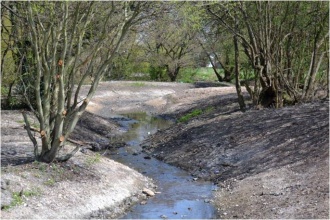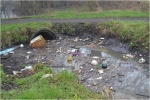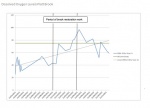Case study:Platt Brook Restoration: Difference between revisions
No edit summary |
No edit summary |
||
| (24 intermediate revisions by 5 users not shown) | |||
| Line 1: | Line 1: | ||
{{Case study status | {{Case study status | ||
|Approval status= | |Approval status=Approved | ||
}} | }} | ||
{{Location | {{Location | ||
| Line 29: | Line 29: | ||
This project was delivered by the Birmingham Brooks Partnership and is a sister project to the Short Heath Brook project - http://restorerivers.eu/wiki/index.php?title=Case_study%3AShort_Heath_Brook_Project | This project was delivered by the Birmingham Brooks Partnership and is a sister project to the Short Heath Brook project - http://restorerivers.eu/wiki/index.php?title=Case_study%3AShort_Heath_Brook_Project | ||
Engagement with local community leading to adoption by WatersideCare group. | |||
|Monitoring surveys and results=Water quality monitoring is showing improvements in dissolved oxygen since the restoration work - see DO chart below. | |||
Invertebrate monitoring undertaken in Spring 2012 before works commenced gave a very low BWMP score of 7/200. Biological sampling will be repeated in Spring/Summer 2014. | |||
Changes in public opinion of the brook prior to and after the restoration scheme have also been recorded - see survey results below. | |||
}} | }} | ||
{{Image gallery}} | {{Image gallery}} | ||
{{Case study image | {{Case study image | ||
|File name=Platt | |File name=Platt brook before.jpg | ||
|Caption=Platt Brook before restoration | |Caption=Platt Brook before restoration | ||
}} | }} | ||
| Line 42: | Line 49: | ||
|File name=Platt Brook bed after.jpg | |File name=Platt Brook bed after.jpg | ||
|Caption=Platt Brook bed after restoration | |Caption=Platt Brook bed after restoration | ||
}} | |||
{{Case study image | |||
|File name=Platt Brook DO.jpg | |||
|Caption=Platt Brook Dissolved Oxygen results | |||
}} | |||
{{Case study image | |||
|File name=Platt Brook Resident Opinion Survey.jpg | |||
|Caption=Platt Brook restoration resident survey | |||
}} | }} | ||
{{Image gallery end}} | {{Image gallery end}} | ||
{{Toggle button}} | {{Toggle button}} | ||
{{Toggle content start}} | {{Toggle content start}} | ||
{{Case study subcatchment}} | {{Case study subcatchment | ||
{{Site}} | |Subcatchment=Platt Bk - source to conf R Tern | ||
}} | |||
{{Site | |||
|WFD water body code=GB109054050210 | |||
|WFD water body name=Platt Bk - source to conf R Tern | |||
|Heavily modified water body=No | |||
|Protected species present=No | |||
|Invasive species present=No | |||
}} | |||
{{Project background}} | {{Project background}} | ||
{{Motivations}} | {{Motivations | ||
{{Measures}} | |Physico-chemical quality elements=This watercourse has been subject to sources of urban diffuse pollution such as from misconnections and fly-tipping. | ||
|Other motivation=The project aimed to improve the look of and access to the watercourse for the benefit of the local community. | |||
}} | |||
{{Measures | |||
|Bank and bed modifications measure=Restoring gravel bed, | |||
|Planform / Channel pattern=Meandering channel, | |||
|Other technical measure=Removal of accumulated debris and silt. | |||
|Social measures=Community involvement, | |||
}} | |||
{{Hydromorphological quality elements header}} | {{Hydromorphological quality elements header}} | ||
{{End table}} | {{End table}} | ||
Latest revision as of 16:30, 2 January 2019
Project overview
| Status | Complete |
|---|---|
| Project web site | http://www.bbcwildlife.org.uk/nia/projects/platt-brook-restoration-project |
| Themes | Social benefits, Water quality, Urban |
| Country | England |
| Main contact forename | Will |
| Main contact surname | Groves |
| Main contact user ID | User:Wgroves |
| Contact organisation | Environment Agency |
| Contact organisation web site | http://www.environment-agency.gov.uk |
| Partner organisations | Birmingham City Council, Environment Agency, Birmingham and Black Country NIA |
| Parent multi-site project | |
| This is a parent project encompassing the following projects |
No |
Project summary
The project aims were to improve the aesthetics, water quality and biodiversity of the Platt Brook in Sheldon, Birmingham. The focus of the project was a section of the brook flowing through public land surrounded by high density housing.
Before the project, the brook was much neglected and suffered from silt build up, flytipping and pollution from misconnections and other sewer misuse.
During the restoration works silt was removed and its banks were pulled back to recreate a more natural river channel. It is hoped that the scheme will help the brook to self-cleanse and re-oxygenate, providing much needed urban habitat for wildlife and making the brook more accessible for people.
The project was delivered in 2013.
Since the end of the project the brook has been adopted by a community based WatersideCare group - http://www.keepbritaintidy.org/watersidecare/689
This project was delivered by the Birmingham Brooks Partnership and is a sister project to the Short Heath Brook project - http://restorerivers.eu/wiki/index.php?title=Case_study%3AShort_Heath_Brook_Project
Engagement with local community leading to adoption by WatersideCare group.
Monitoring surveys and results
Water quality monitoring is showing improvements in dissolved oxygen since the restoration work - see DO chart below.
Invertebrate monitoring undertaken in Spring 2012 before works commenced gave a very low BWMP score of 7/200. Biological sampling will be repeated in Spring/Summer 2014.
Changes in public opinion of the brook prior to and after the restoration scheme have also been recorded - see survey results below.
Lessons learnt
Image gallery
|
Catchment and subcatchmentSelect a catchment/subcatchment
Catchment
Subcatchment
Site
Project background
Cost for project phases
Reasons for river restoration
Measures
MonitoringHydromorphological quality elements
Biological quality elements
Physico-chemical quality elements
Any other monitoring, e.g. social, economic
Monitoring documents
Additional documents and videos
Additional links and references
Supplementary InformationEdit Supplementary Information
| ||||||||||||||||||||||||||||||||||||||||||||||||||||||||||||||||||||||||||||||||||||||||||||||||||||||||||||||||||||||||||||||||||||||||||||||||||||||||||||||||||||||||||||||||||||||||||||||







